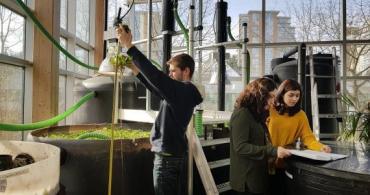Teaching, learning and research opportunities have been identified within the GBAP’s framework to help frame policy and investigate technical issues and large scale challenges such as climate change. Additionally, through the Campus as a Living Lab approach, UBC provides unique opportunities for academic engagement with buildings via the processes of planning, design, construction and operations which can help provide innovative operational solutions.
Teaching, Learning, Research Levels
The GBAP relies on the unique opportunities available at UBC to tie the plan for the built environment to teaching, learning and research at three different levels:
Level 1: Educational and engagement activities
These are actions driven by the needs of the Green Building Action Plan and focused on educating and engaging the campus community and external partners in the aspirations, goals, strategies and actions of the GBAP. Examples include website information, art projects, signage, student events or workshops.
Level 2: Small scope research studies
These are discrete research projects that answer specific questions or address specific gaps in knowledge that are needed to develop policy or guidelines for the GBAP. Developed by Sustainability and Engineering staff (or other staff-leads identified in the actions) and supported by UBC, project examples include SEEDs and Sustainability Scholars projects, or using academic courses to explore specific options.
Level 3: Large-scale or long-term research projects
These are research projects with sustained academic involvement that tackle more complex questions or issues, especially in the emerging themes within the GBAP or opportunities around innovative pilot projects. These would provide opportunities for interdisciplinary and applied research projects that could be eligible for external research funding. Lessons and results could be applicable to the region and building industry beyond UBC.
